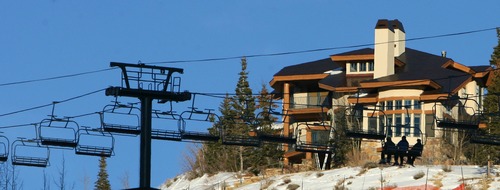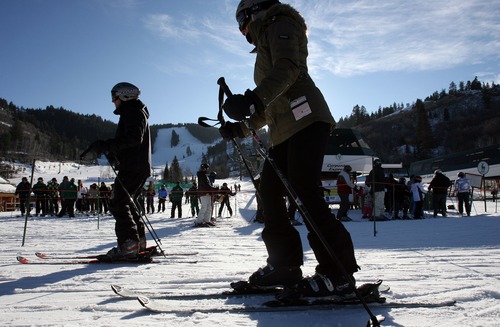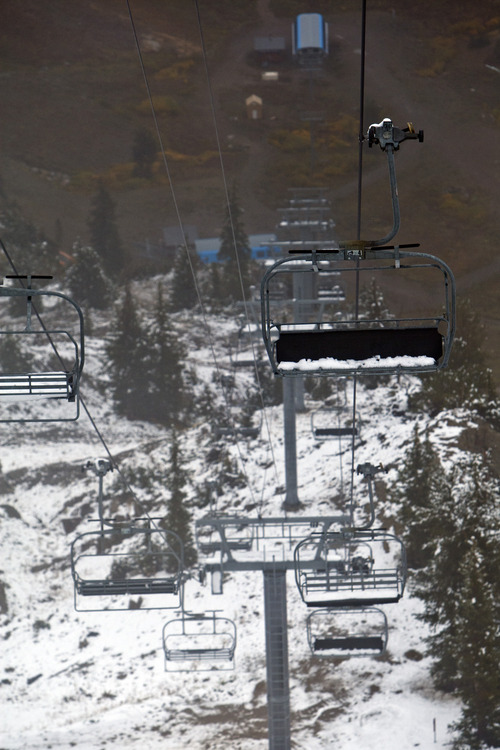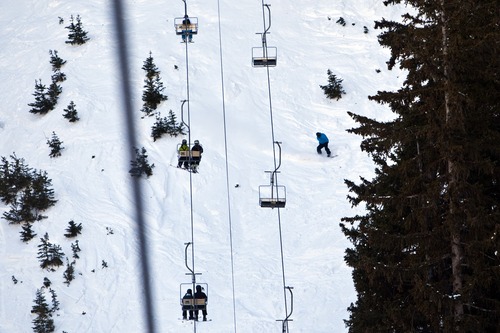This is an archived article that was published on sltrib.com in 2014, and information in the article may be outdated. It is provided only for personal research purposes and may not be reprinted.
Utah's ski industry is ready to interconnect the seven ski resorts in Salt Lake and Summit counties.
Ski Utah and the resorts have called a 2 p.m. news conference Wednesday at the Salt Lake City Sheraton Hotel to discuss their concept of a series of chairlifts on private lands that would link resorts from Deer Valley to Snowbird.
Other than that, he declined Tuesday to discuss specifics of the revived concept, which has been advocated and attacked for years.
Backcountry skiers fear more lifts will flood their prime terrain — which until now has been reached only by those willing to work to get there — with lift-delivered skiers going beyond resort boundaries even though many don't have the skills to traverse those slopes safely (while also raiding powder stashes).
The ski industry, however, believes that interconnecting the seven resorts — Snowbird, Alta, Solitude, Brighton, Canyons, Deer Valley and Park City Mountain Resort — is vital to Utah's ability to keep up with, or even gain ground, on Colorado and California.
Those two states attract far more skiers and snowboarders than Utah's 4 million or so per year. Colorado draws three times that, a gap state ski officials believe will diminish only if Utah takes advantage of the geographical proximity of the seven resorts, interconnecting them with a system similar to what is done in the Alps.
While the concept has been around for decades, conversations about linking the resorts picked up in the last year. Resorts met with each other individually or in groups to talk possibilities.
The conversations even were cited in the high-profile legal battle being waged between Park City Mountain Resort and Canyons Resort over whether PCMR allowed its lease to expire on the 3,800 acres of mountainside it rented from Canyons.
"Discussions About A Possible Interconnection Among The Ski Resorts In the Salt Lake City Area Were Consistent with the Leases' Requirements," said a bold-faced headline over a section in a Jan. 22 motion by Canyons Resort for summary judgment on part of that case.
As a courtesy, Rafferty gave Save Our Canyons Executive Director Carl Fisher a heads-up Tuesday afternoon about Ski Utah's announcement.
Like many, Fisher had known for some time that an interconnect proposal would surface, so he was not surprised. But he expressed doubt that all of the required links could be made without involving public lands, which likely would subject the plan to a lengthy environmental impact study by the U.S. Forest Service.
"I asked [Rafferty] about the lift alignments and he said, 'There's none yet.' But you can't really say you're not going to impact public lands if you don't have the alignments," Fisher said.
One of the problems with SkiLink was that its proposed alignment went over a block of Forest Service land.
Rep. Rob Bishop, R-Utah, introduced legislation in Congress to force the Forest Service to sell that land so the agency's process would not impede the project, but his controversial bill withered without action.
Fisher also maintained that providing more upper-mountain access so skiers can ply the backcountry amounts to "de facto resort expansion that we feel the public is vehemently opposed to."
It's unclear how the ski industry's initiative will impact the Mountain Accord, an effort by a broad-based group of vested interests to forge a long-term plan for the central Wasatch Mountains.
The ski industry, conservation groups and backcountry skiers all are part of that still emerging effort, whose call for unity and cooperation could be undermined if the industry launch evokes distrust instead.
"You always knew interconnect or resort expansion would be issues Mountain Accord would have to grapple with," Fisher said, expecting the industry to be "all in. They want interconnect. They want improved transportation. They want it all."
Twitter: @sltribmikeg —
The public has until March 28 to comment on "issues, concerns and possibilities" that should be examined in studies to determine the future of the central Wasatch Mountains. To comment, go to:





